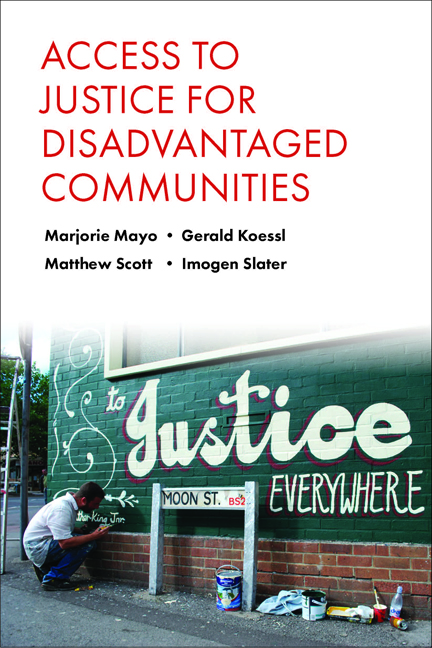Book contents
- Frontmatter
- Dedication
- Contents
- Acknowledgements
- Abbreviations and glossary
- Introduction: accessing social justice in disadvantaged communities
- one Social justice and the welfare state
- two Concepts of justice and access to justice
- three Ethos and values
- four Challenges and dilemmas
- five Public service modernisation, restructuring and recommodification
- six Conflict and competition versus collaboration and planning
- seven Public service modernisation and time
- eight Alienation and demoralisation, or continuing labours of love?
- nine Access to social justice for disadvantaged communities: value and values
- Appendix 1 Research methodology and questionnaire
- Appendix 2 Law Centres included
- Appendix 3 Topic guides for semi-structured interviews
- References
- Index
Appendix 3 - Topic guides for semi-structured interviews
Published online by Cambridge University Press: 01 February 2022
- Frontmatter
- Dedication
- Contents
- Acknowledgements
- Abbreviations and glossary
- Introduction: accessing social justice in disadvantaged communities
- one Social justice and the welfare state
- two Concepts of justice and access to justice
- three Ethos and values
- four Challenges and dilemmas
- five Public service modernisation, restructuring and recommodification
- six Conflict and competition versus collaboration and planning
- seven Public service modernisation and time
- eight Alienation and demoralisation, or continuing labours of love?
- nine Access to social justice for disadvantaged communities: value and values
- Appendix 1 Research methodology and questionnaire
- Appendix 2 Law Centres included
- Appendix 3 Topic guides for semi-structured interviews
- References
- Index
Summary
Law Centres
(1st round interviews)
1. Explore the participant's motivation for becoming involved with Law Centres (whether as a paid worker, volunteer or management committee member).
2. Invite participant to summarise the history of their involvement (e.g. having started to become involved as a volunteer/or client).
3. Has the motivation for their involvement changed over time? If so, in what ways and why?
4. Does the Law Centre(s) have a particular ethos? If so, how would they describe this? How important is this for them?
5. How (if at all) might this relate to wider debates about the future of the public service ethos more generally?
6. Invite the participant to comment more specifically on their views on the impact of recent policy changes. How have these changes affected them, both in practical ways and in terms of their motivation and commitment?
7. How have these changes been managed/coped with? And how has the participant been managing these changes and their feelings about them?
8. Are there tensions/professional dilemmas involved here? If so, how does the participant cope with these/with what coping strategies and resources to draw upon (both internal resources and external resources, including sharing tensions with colleagues/former colleagues/friends)?
9. More generally, how does the participant see the future of Law Centres, taking account of differing/contradictory policy objectives e.g. for enabling the most disadvantaged to become active consumers of public services whilst also saving money on legal services – and for promoting ‘new and more accountable forms of professionalism’ rather than de-professionalisation?
10. How does the participant see their own future in Law Centres – or elsewhere?
Other stakeholders (such as local authorities)
(2nd round interviews)
1. How have you/your organisation come to be supporting/resourcing/working in collaboration with/in partnership with the Law Centre (initial motivation/and continuing motivation)?
2. How would you describe your organisation's particular relationship with the Law Centre? Has this changed over time? If so in what ways and why? Have there been differences of perspective (e.g. between councillors and officers)?
3. How would you describe the Law Centre's particular ethos – and its particular contributions to local communities – and to access to justice more widely? (commenting on Law Centres’ own views on their specific roles and contribution including):
• reaching particularly disadvantaged groups/communities regardless of ability to pay for access to justice
• providing holistic services to individuals/communities/addressing related issues such as housing/benefits/immigration holistically
- Type
- Chapter
- Information
- Access to Justice for Disadvantaged Communities , pp. 147 - 150Publisher: Bristol University PressPrint publication year: 2014



